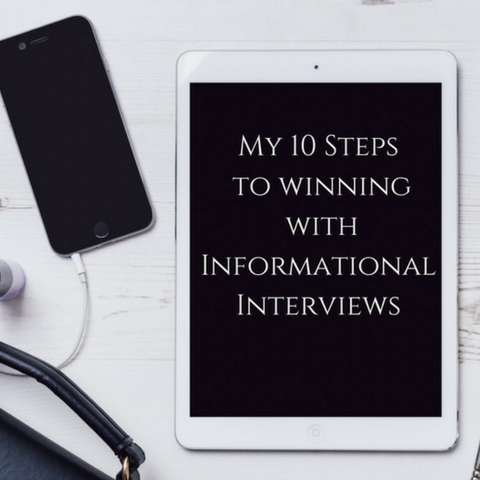Hey Winner, Did I hear you say 'Informational Interview'
I hate to say it but summer will be over next month and for many of us, that means we’ll start frantically assessing whether we’ve made progress on our 2016 goals. If you had any career-related aspirations on that New Year’s resolution list, it’s not too late to achieve them. In fact, an informational interview might be the pivotal factor that gets you closer to the goal whether you are trying to get a new job, start your own venture or get into grad school. Executing an informational interview is a simple but genius act that propels you past your competition because it gives you insider knowledge. And personally, it has saved me years of turmoil because I learned that I just couldn’t thrive in certain industries through these informal conversations. Informational interviews also played a huge role in getting me into Johns Hopkins for grad school and helped me land my current role as a research analyst at a highly selective organization. If you are anything like me, you at least need to attempt to achieve your goals in order to feel at peace by the time New Years Eve rolls around. Here are my ten steps to getting an informational interview and killing it:
1. Identify exactly what you want. If you know what role you are looking to fill, great. If not, enter this process with the mindset that you are conducting informational interviews to learn about roles that allow you to use your skills and interests.
2. Why do you want this role or why you are exploring this industry? Your answer to this question should weave in your skills and interests. You should feel confident about this answer because it is going to be in your opening statement when asking for a meeting and when you start the actual informational interview. And be honest with yourself because we all know a bull-shitter when we see one and you don’t want to be one. Even if your reason is, “I need a job and this seems like the least boring”, that is a better place to start than a cookie cutter answer you found on the internet.
*And if in fact, your reasoning is that you need a job and this seems like the least boring, you can improve your language by articulating it along the lines of: “After my last position as a ________, I knew that I wanted to pursue a job that excited me and this position seems like one that I would learn from and contribute to because I am interested in _________, _________ and _________”.
3. Write down each of your questions for them. Even if you are just conducting informational interviews because you want an “in” so you can get your resume through the backdoor, you should still ask questions about the company that you can’t find the answers to online. This makes the person on the receiving end of the call/email feel like you are genuinely interested in a piece of their world instead of feeling like you are just using them.
4. Go on Linkedin and search for the company’s (or companies’ if you are interested in exploring a new industry) name and you will see existing connections that work at that firm. The person who is closest to you at that company will be the first one you reach out to. The people you know least will be the last ones you reach out to. Linkedin is great for this kind of interaction because people expect your message to be about career-related. That being said, if you aren’t connected to someone on Linkedin, but you have their email, reach out to them via email.
5. Email them asking to meet in person or connect via phone or Skype and specify why you want to meet with them.
6. Do everything you can to make this whole interaction as convenient for them as possible. You should be prepared to pay for the meal or drink (assuming you will meet at a café or restaurant) and make the meeting location suitable for them.
7. Follow up a couple of days before the actual meeting day confirming that you are excited to meet with them and repeat the logistical details.
8. The day before you meet this person, do a quick google search on what is happening in the industry. You don’t want to show up at an informational interview completely unaware of a major current event in their world.
9. When you meet with them, smile and mentally prepare for an honest conversation. You are not asking this person for a job, you just want to hear their perspective and share your thoughts. This is a two-way conversation so loosen up and allow it to be just that. If it becomes obvious that you would be better off in a different role or industry, you can ask if the person has a contact in that role or industry. And if the position is in fact a good fit for you, you can close by asking if they could pass your resume on to the hiring manager for the position.
10. Follow up within 24 hours with a thank you email (this one is good) or handwritten note (this one is better) that specifically states what you gained by meeting with them. For bonus points, also let the person know what you are going to do with the information they gave you. This last step reaffirms for the person that they made a good choice in spending their time on you.
That is it!
Not that hard right?
Ok now, go get’em.
